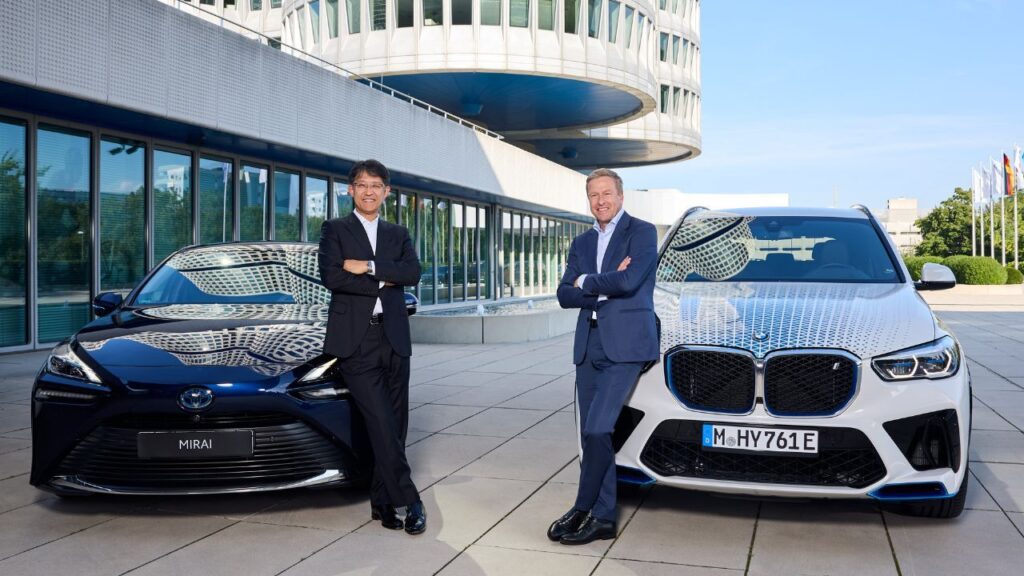The BMW Group is exploring hydrogen technology. They plan to launch hydrogen fuel cell cars in 2028. BMW sees the promise of this clean solution. To help with this, they are partnering with Toyota, a leader in hydrogen cars. This teamwork will mix BMW’s advanced eDrive technology with Toyota’s strong experience in fuel cells. Together, they hope to start a new time of sustainable mobility.
The Dawn of BMW’s Hydrogen Fuel Cell Technology
BMW is focused on using hydrogen fuel cell technology because it wants to support sustainable mobility and cut down carbon emissions. The company knows that many actions are needed to effectively fight climate change. Hydrogen fuel cells provide a great option for long trips and fast refueling, which is important for drivers.
This shift to hydrogen supports the rising need for eco-friendly vehicles and goes well with BMW’s current work in the electric vehicle field. Hydrogen cars are seen as electric vehicles since they run only on an electric motor, which makes them different from traditional combustion engine vehicles.
Unpacking BMW’s Collaboration with Toyota
The partnership between BMW Group and Toyota is an important step in making hydrogen fuel cell technology better. Toyota is a leader in this area with its Mirai model, showing that hydrogen-powered cars can work well.
This teamwork helps both companies learn from each other, use their resources wisely, and speed up the creation of eco-friendly transport solutions. Toyota shares its knowledge of fuel cell systems, and BMW adds its skills in electric drive systems and making vehicles.
By combining their strengths, BMW and Toyota want to tackle issues with hydrogen technology. They aim to improve infrastructure and lower production costs to make hydrogen a realistic and affordable choice for people around the world.
Timeline and Milestones: The Road to 2028
BMW has laid out a clear roadmap for introducing its hydrogen technology, with key milestones leading up to the 2028 launch. The company began testing a pilot fleet of BMW iX5 Hydrogen vehicles in 2023, garnering real-world data and refining the technology based on user feedback. These vehicles will also be featured in a world tour to increase awareness and demonstrate the capabilities of BMW’s hydrogen technology.
| Milestone | Year | Description |
| Pilot Fleet Testing | 2023 | Testing the BMW iX5 Hydrogen |
| Small-Scale Production Run | 2024 | Limited production of hydrogen cars |
| Expanding Partnerships | 2025-2027 | Collaborations for infrastructure and technology |
| Market Launch | 2028 | Introduction of hydrogen cars to select markets |
While the initial focus is on passenger cars, BMW also sees potential for hydrogen technology in commercial vehicles. The company believes that hydrogen fuel cells can be particularly well-suited for heavy-duty vehicles and long-haul transportation, contributing to a broader decarbonization of the transport sector.
Understanding Hydrogen Fuel Cell Vehicles (FCEVs)
Hydrogen fuel cell vehicles (FCEVs), such as BMW’s hydrogen car, use hydrogen technology to run an electric motor. The only thing they emit is water vapor. These vehicles have an important role in helping us move towards sustainable mobility. They use green hydrogen that is made through electrolysis. FCEVs provide a versatile energy source with zero pollution, which helps keep our environment cleaner. It is important to understand how FCEVs work. This understanding helps us see their place in the shift to clean energy solutions in the automotive industry.
How FCEVs Work: The Science Behind Hydrogen Power
Hydrogen vehicles, like battery-electric vehicles, use an electric motor to move. The difference is in how they make electricity. In fuel cell electric vehicles (FCEVs), electricity comes from a process called reverse electrolysis that happens in the fuel cell.
Fuel cells are made up of individual cells. Each cell has three parts: an anode, a cathode, and an electrolyte membrane. Hydrogen gas from the tanks in the vehicle goes to the anode. Oxygen from the air around us goes to the cathode. When hydrogen molecules reach the anode catalyst, they split into protons and electrons.
The protons pass through the electrolyte membrane to the cathode, while the electrons go through a circuit outside the fuel cell. This creates electrical energy to power the electric motor. This energy can directly run the vehicle or charge a battery for later use.
BMW’s Approach to Hydrogen Fuel Cell Technology
BMW Group is working hard to develop its hydrogen car technology. They are doing this in a few key ways. First, BMW wants to make its fuel cell systems very efficient. This means they should convert hydrogen into electricity without wasting much energy.
Second, BMW knows that making fuel cell systems smaller and lighter is important. This will help improve how far the cars can go and their overall performance. By focusing on size and weight, BMW hopes to make hydrogen cars that can compete well with battery-electric vehicles in range and how they drive.
Lastly, BMW realizes there are challenges with making hydrogen and building the right infrastructure. The company is joining efforts and partnerships to support the use of green hydrogen. This type of hydrogen is made using renewable energy sources. They also want to create a strong hydrogen refueling network.
The Future of Mobility in India: Hydrogen Cars
As India moves towards a greener future, there is a big opportunity for hydrogen cars. The government is focusing on renewable energy and sustainability. Hydrogen fuel cell technology fits well with India’s goal of lowering carbon emissions and becoming energy independent.
For hydrogen cars to succeed in India, everyone needs to work together. This includes car companies, energy providers, and lawmakers. Building a strong hydrogen refueling network is important. We need to encourage the production and use of green hydrogen. Also, raising public awareness will help support hydrogen-powered mobility in India.
Conclusion
In conclusion, the partnership between BMW and Toyota to release hydrogen car technology in 2028 is a big step for sustainable mobility. This new way of using hydrogen fuel cell vehicles shows a bright future for eco-friendly transportation. India will play an important role in this launch. The market for hydrogen cars in India is set to grow, giving people a greener choice to reduce pollution. As we look forward to 2028, the progress in hydrogen technology for cars represents a move towards a cleaner and better future for the car industry.
Frequently Asked Questions
What Makes BMW’s Hydrogen Technology Different?
BMW Group wants to set its hydrogen technology apart. They plan to do this by using Toyota’s fuel cell stack along with their own advanced fifth-generation electric motor technology. This combination will also include smart design features. It is expected to produce a total system output of 374 hp. This will provide a strong boost in power, improving the overall driving experience.
How Will Hydrogen Cars Contribute to Reducing Pollution in India?
Hydrogen cars do not create any tailpipe emissions. They only let out water vapor. As India grows its clean energy options, such as solar energy, the production of green hydrogen will grow too. This will help greatly reduce the emission of pollutants from transportation.
Can Hydrogen Cars Become Mainstream in India by 2028?
Reaching widespread use of hydrogen cars in India by 2028 is hopeful. However, it depends on some key things. We need the government to provide support and create good policies. Fast development of refueling stations for hydrogen is also necessary. Lastly, more people need to accept and trust hydrogen cars for this to happen.
What are the benefits of using hydrogen technology in cars?
Using hydrogen technology in cars comes with many benefits. It helps reduce emissions a lot and provides a cleaner option compared to fossil fuels. The energy conversion process is very efficient. Plus, it can run on renewable energy, making hydrogen a flexible energy source.
What makes hydrogen technology a sustainable option for future transportation?
Hydrogen technology is very important for making transportation eco-friendly. This is especially true when it is powered by green hydrogen. Green hydrogen is made from renewable energy sources. It has a low impact on the environment. This makes it a great option for how we move around in the future.
How does BMW’s collaboration with Toyota impact the development of hydrogen car technology?
The BMW Group and Toyota are working together to develop new technology. This partnership helps them share ideas, making progress faster in hydrogen car technology. By combining their skills, they are driving innovation in this area.
Are there any infrastructure requirements for supporting the use of hydrogen cars?
To make hydrogen cars common, we need to invest a lot in infrastructure. This means we must build many hydrogen fueling stations. We also need to increase hydrogen production facilities. Lastly, we must set up good distribution networks to support this switch.







